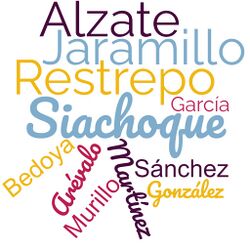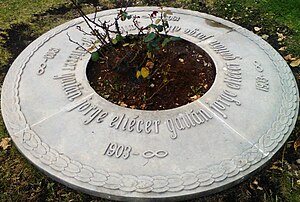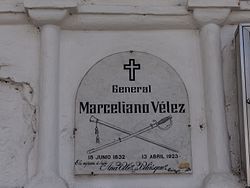
Colombian surnames are surnames used by people from Colombia, as well as the Colombian diaspora located in the United States, Spain, Panama and especially, Venezuela, with the first mass migration of Colombians into Venezuela in the 1950s.[1] These surnames are an essential aspect of the country's rich cultural heritage, often reflecting a person's ancestry, occupation, or geographical origin. Colombian surnames are primarily derived from Spanish naming conventions, which include a combination of the father's paternal family name followed by the mother's paternal family name.
History of Colombian Surnames
See also Hispanic surnames
Colombia is a Spanish-speaking country in South America, and as such, the majority of its surnames have Spanish origins, just like in the rest of the Hispanic American countries. The use of surnames in Colombia dates back to the Spanish colonization period, when Spanish settlers brought their naming conventions to the region. Over time, these surnames have evolved and adapted to the diverse cultural influences present in Colombia, including indigenous, African, and European elements.
Colombian naming conventions

The Spanish naming convention used in Colombia is often referred to as the "double-barrelled" or "hyphenated" surname, a custom they have carried when emigrating to other countries, especially those where Spanish naming conventions are not the norm. This convention involves combining the father's paternal family name with the mother's paternal family name, creating a two-part surname. For example, if a man named Juan Carlos Gómez López marries a woman named María Rodríguez García, their child would have the surname Gómez-Rodríguez in a non-Spanish-speaking country and two surnames, Gómez Rodríguez in a Spanish-speaking country, as usual.[2]
It is worth noting that while this is the most common naming convention in Colombia, it is not the only one. Some families may choose to use only one surname, such as the father's or mother's paternal family name. Others may combine both parents' surnames in a different order, such as the mother's paternal family name followed by the father's paternal family name.
Colombian surnames of Subsaharan African origin
In Colombia, many individuals of African descent (called Afro-Colombians) managed to keep surnames based on descriptive names they brought with them and used them as surnames, while adopting Christian Spanish given names after being baptized. Most of these Colombian surnames of Subsaharan African origin are from four origins: Kongo (Matamba, Congo, Angola, Malemba, and Ambuila), Ewe-Fon (Mina and Arara), Efik-Efok (Carabalí) or Yoruba (Lucumi).[3] Most Afro-Colombians live in the coastal areas of the country, especially on the coast of the Pacific Ocean, where they are the overwhelming majority of the population.[4]
Colombian surnames of Indigenous origin
See also Mesoamerican and Andean surnames
Most Native Americans and Mestizos received a Spanish surname when they were baptized in the days of the colony, as early as the late 1600s, in some regions with a large majority of Native Americans, like the Guajira Peninsula, and to some extent in other areas of the country like the Cundinamarca-Boyacá Plateau, inhabited by the Muisca people and the Nariño Department, inhabited by the Pasto people.[5] Some of the most common Colombian surnames of indigenous origin are:
Popular Colombian surnames and their origins
The most common surnames in Colombia are all of Spanish origin, reflecting the country's heritage:[6]
- Rodríguez, meaning "son of Rodrigo"
- Martínez, meaning "son of Martin"
- García, possibly derived from a Basque word meaning "bear"
- López, meaning "son of Lope"
- Gómez, possibly derived from the Visigothic word gome, "man"
- González, meaning "son of Gonzalo"
- Hernández, meaning "son of Hernando"
- Sánchez, meaning "son of Sancho" (saint)
- Murillo, meaning "small wall"
- Núñez, meaning "son of Nuno"
Geographic locations for Colombian surnames

People with Colombian surnames are primarily located in Colombia, but due to migration and globalization, Colombians carrying these surnames can also be found in other countries, particularly in the United States, Spain, and other Latin American countries where the Colombian diaspora has settled, especially Venezuela.[7] The distribution of surnames in Colombia can also provide insight into the country's history and demographics. For example, the surname Rodríguez is most commonly found in the Caribbean region, while the surname González is more prevalent in the Andean region. Surnames like Martínez and García are distributed more evenly across the country, while Restrepo, one of the surnames most easily associated with Colombia, is of Asturian origin but more commonly found in the Antioquia department and the Colombian coffee growing Axis.[8][9][10]
Celebrities with Colombian surnames
- Carlos Alberto Vives Restrepo, singer and songwriter
- Shakira Isabel Mebarak Ripoll, singer and songwriter
- Gabriel José de la Concordia García Márquez, writer, Nobel Prize in Literature
- Sofía Margarita Vergara Vergara, actress
Explore more about Colombian surnames
- Last names on MyHeritage
- Historical records from Colombia on MyHeritage
- Colombian Last Names and Meanings at Family Education
- General Archive of the Nation | Archivo General de la Nación
References
- ↑ María Clara Robayo. Venezolanos en Colombia, un eslabón más de una historia compartida. Universidad del Rosario. September e 2018
- ↑ Curiosities: Why are so many Hispanic names hyphenated? University of Wisconsin-Madison
- ↑ African Surnames in Colombia. Insight News
- ↑ Afro-Colombians on the Pacific Coast: Research Inquiry Blog Post
- ↑ Apellidos indígenas colombianos: lo que usted no sabía de ellos. Hablemos de Culturas
- ↑ Los 50 apellidos más comunes en Colombia, ¿está el suyo?
- ↑ As Colombia Emerges from Decades of War, Migration Challenges Mount. Migration Policy Institute
- ↑ Curas, negociantes, poetas: todo hay en los Restrepo. El Colombiano
- ↑ El orgullo de ser un Restrepo. El Tiempo
- ↑ Genealogías, historia, familias y descendientes del apellido RESTREPO. Genealogías de Colombia